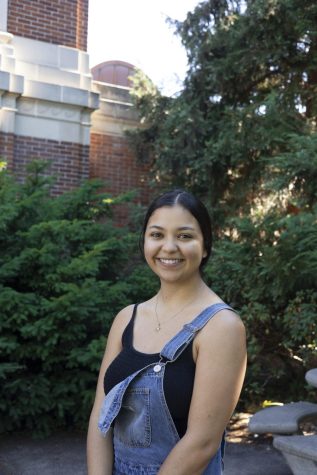Students offered resources to combat housing costs
March 2, 2020
The threat of housing insecurity becomes more prevalent as students are moving off campus and into leased housing for the upcoming academic school year.
Rent for housing continues to rise in Corvallis, Ore. while the minimum wage peaks at only $11.25 per hour in the local community. This leaves students struggling to find housing they can afford, and risking other aspects of their wellbeing in order to make rent each month.
“Recent data nationally has come out that a little bit less than half of the student population at public universities face some type of basic needs insecurity,” said Miguel Arellano, the basic needs navigator at the Human Services Resource Center at Oregon State University. “Housing insecurity includes being unsheltered, but also includes not being able to pay your rent in full or not being able to pay your electricity bill in full, things like that.”
In the Campus Inclusivity Report conducted by Student Affairs Assessment at OSU, 47.7% of first-generation students reported working over 20 hours a week, and 26.3% of students reported working 40 hours or more per week.
This excess of hours are most likely worked in order to combat the aspects of living off campus a student might not always consider when moving, according to Arellano. These costs can include first-time move-in fees, utilities, landscaping and grocery costs.
“There’s a lot of things that you can do to save money, and the more money you save the more you supplement your budget by accessing resources, [so] a lot of money you save can be redirected to rent,” Arellano said.
The Supplemental Nutrition Assistance Program is one of the many resources the HSRC offers to offset the costs of expensive housing for students. Students can apply and receive a maximum of $194 in the form of an EBT card, accepted at most grocery stores in Corvallis.
Along with SNAP, students can secure emergency grants, emergency aid within their college, using the food pantry and using the textbook lending program at the HSRC.
There are also housing options in Corvallis that will work with students with financial struggles. The 7th Street Station is one of the cheaper dorm-style apartment buildings off campus. For $764 per person each month, students can live in a single room with an attached bathroom, in a unit with three other residents and a shared common space.
“Typically we have a security deposit which we are waiving, but it is the lowest on the market at $150 per person,” said Rachel Zenaty, general manager at 7th Street Station. “You don’t have to do first and last [rent], it’s just the first installment that’s due in September.”
Zenaty also mentioned that the application fee is often waived, as this tends to be a cost students don’t realize factors into looking for off-campus housing. As a part of the rent cost, all utilities are included except for electricity, which is billed back for each month.
“One of our main core values are ‘put students first, and do the right thing,’ so obviously we understand that students have financial struggles or what-not, which is why our security deposit is so low,” Zenaty said. “If you’re communicating with us, we’ll set up a payment plan based on if you layout reasonable dates. Or, let’s say, you have financial aid and you want to pay a bulk of your lease up front, you can do that.”
Leasing rules have also been tailored to benefit students who receive financial aid, Zenaty said. In the past, they did not accept financial aid as a source of income until they realized it might be a student’s sole asset for paying rent.
Even if a student solely relies on a job’s pay to make rent, the exact same income each month is not always guaranteed.
“Sometimes I’m not able to make it to work or I’m sick and I miss out on work, or there is some external factor and life happens and you have to spend money somewhere,” said Asra Noor, senior and biochemistry major. “I’m an international student so a lot of the benefits don’t fall to me, so I use the food pantry occasionally.”
International students are unable to apply for grants like the Pell Grant, and therefore have to look for other options to supplement their budget.
Noor also works in the food pantry at the HSRC and said there has been a steady increase in students using their services versus previous years, as she continues to use them herself.
“It’s gotten to the point in Corvallis where it’s not necessarily ‘where can I find cheap housing?’” Arellano said. “It’s really like… ‘where can I save, what’s my budget, and what am I willing to give up in order to save money on my rent?’”











































































































